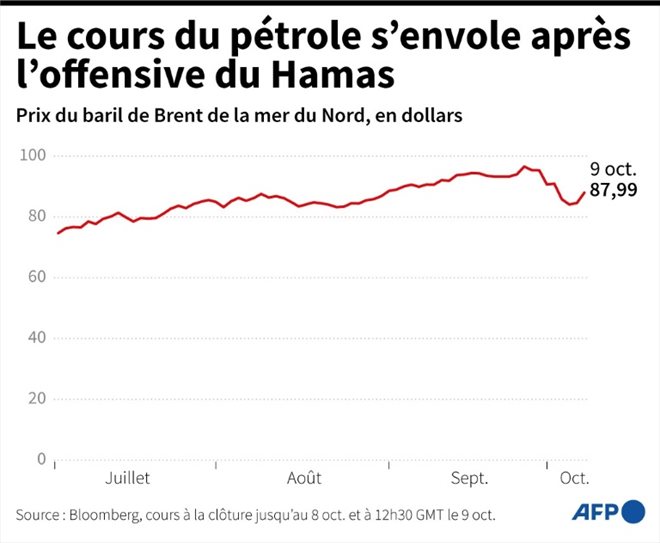TotalEnergies oil refinery in Donges, western France (AFP/LOIC VENANCE)
Oil prices soared on Monday after the surprise offensive this weekend by the Palestinian Islamist movement Hamas against Israel, with the market fearing a geopolitical escalation and supply disruptions, while gas prices jumped in particular after the announcement of the closure of a gas field in Israel.
Around 4:20 p.m. GMT (6:20 p.m. in Paris), the price of a barrel of North Sea Brent, for delivery in December, rose 4.04% to $88.00. That of American West Texas Intermediate (WTI) for delivery in November was up 4.18% to $86.25.
This buying momentum was driven “by investors who added a geopolitical risk premium into the price and new demand after last week’s sharp correction,” explains Ole Hansen, analyst at Saxobank.
For its part, the price of gas also jumped. The Dutch TTF futures contract, considered the European benchmark, climbed around 12.49% to 43.00 euros per megawatt hour (MWh), returning to its high levels at the end of September.
Fears of supply disruptions are also behind the surge in gas prices, says Michael Hewson of CMC Markets.

Oil prices soar after the Hamas offensive (AFP/Julia Han JANICKI, Olivia BUGAULT, Paz PIZARRO)
One reason given by the analyst is the suspension by the American hydrocarbon giant Chevron of the activities of its Tamar gas platform, located off the Israeli coast, on instructions from the Israeli government after the Hamas offensive, as indicated by the American group to AFP on Monday.
The war has already left nearly 1,300 dead, according to official reports from both sides.
“I think that what we can all wish for today is (…) to avoid a regional conflagration which would have significant political consequences and also economic consequences”, declared Monday the Minister of the Economy and Finances Bruno Le Maire.
“Even if the balance (…) between supply and demand is not affected for the moment, attention is now firmly focused on Iran, the main support” of the Palestinian Islamist movement Hamas, explains Tamas. Varga, from PVM Energy.
– Retaliation –
Hamas’ surprise offensive indeed raises “concerns about stability in the Middle East, particularly with regard to Iran”, continues Mr. Hansen, particularly following the publication of an article in Wall Street Journal on Sunday that Tehran helped plan the attack for several weeks. Information rejected Monday by the spokesperson for Iranian diplomacy.
According to Tamas Varga, “any retaliatory measure on Iranian infrastructure”, or “the threat of closing the Strait of Hormuz, through which 17 million barrels of oil per day pass daily”, could cause “prices to soar”.
Tensions in the Middle East and the strengthening of economic sanctions against Iran have already caused prices to jump in the past. From 2011 until 2014, Brent prices fluctuated around $100 per barrel, supported both by the tightening of international sanctions against Tehran and the Syrian conflict.
The crisis comes at a time when oil prices have been falling since the end of September due to fears about demand in the face of macroeconomic difficulties (high rates, inflation, etc.) after weeks of increases driven by an extension of export cuts from the Russia and Saudi Arabia production.
Last week, a panel from the Organization of the Petroleum Exporting Countries and their allies (OPEC+) recommended maintaining the current strategy of lowering production, reinforced by Saudi and Russian cuts, with the aim of supporting prices.
© 2023 AFP
Did you like this article ? Share it with your friends using the buttons below.




